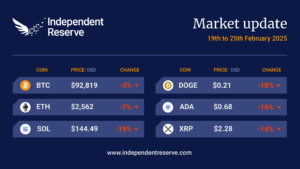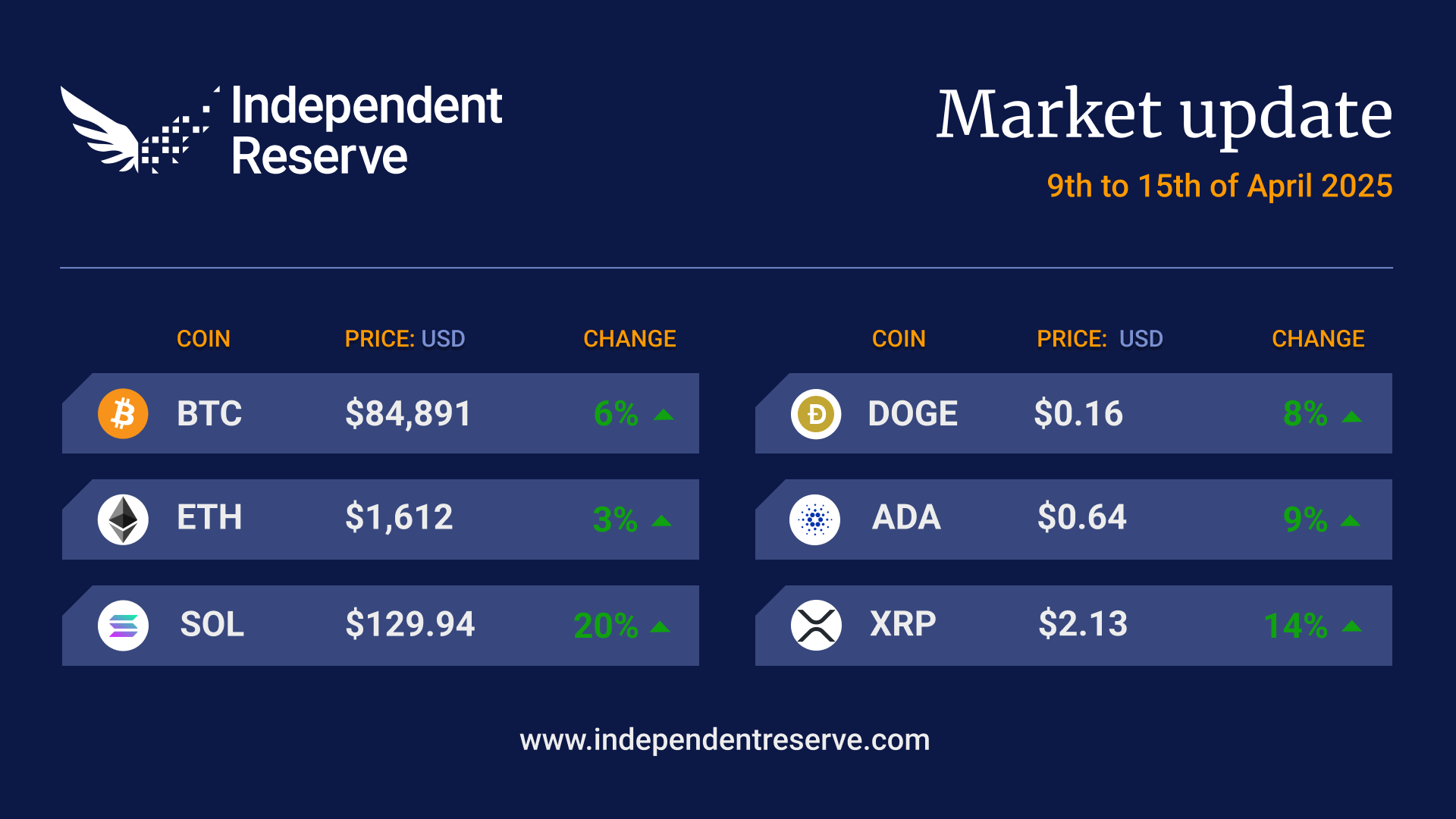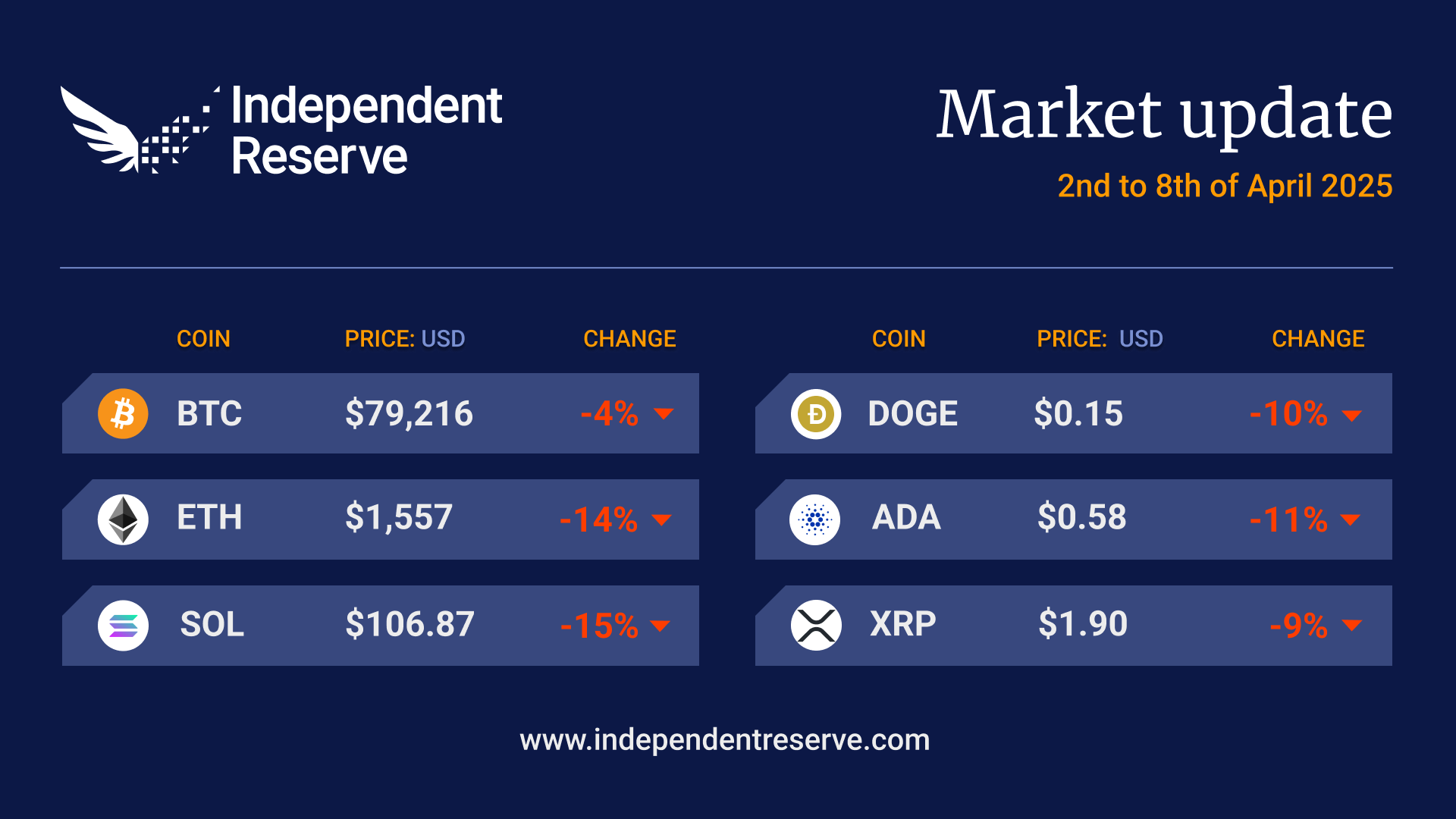In Markets
Thanks to the world’s biggest-ever crypto hack, sentiment turning on memecoins, tech stocks faltering, and Trump’s reported plan to move ahead with tariffs on Mexico and Canada, crypto markets are in retreat. Kaito reports crypto sentiment is back at pre-election levels, the Bitcoin ETFs have lost A$1.46B (US$928.9M) so far in February, and Polymarket foresees just a 10% chance of a Strategic Bitcoin Reserve happening in Trump’s first 100 days. On the other hand, the SEC this week dropped a raft of high-profile crypto investigations and lawsuits, and Real Vision founder Raoul Pal points out that Bitcoin saw five pullbacks greater than 28% in 2017, while alts fell more than 65%. “You guys all need to learn patience,” he counselled. Bitcoin finishes the week down 3% to trade around A$146,792 (US$92,819), while Ethereum is down 7% to trade at A$4,031 (US$2,562) even after Bybit was forced to buy hundreds of millions worth of ETH to make up for funds lost in the hack. XRP lost 14% while the fallout from the Libra token launch scandal (pumped by snipers and then fell 90% in hours) and billions of unlocks coming up in March have seen Solana fall 19% in a week to its lowest price since October 2024. Dogecoin lost 18%, Cardano lost 16%, and Shiba Inu fell 10.5%. The Crypto Fear and Greed Index is at 49 or Neutral.

From the IR OTC Desk
Market overview
- FTX repayments: The week started on an positive note as crypto markets anticipated some liquidity returning following FTX’s initial payout process to creditors. Claims below US$50,000 have begun receiving payouts in USD, and these payouts were expected to total around US$1.2B. BTC/USD traded up to US$99,100 at Independent Reserve, marking the high of the week.
- Bybit hack: Market sentiment quickly turned bearish in light of the biggest hack in crypto history on the exchange Bybit. Early Saturday morning, Bybit lost 446,870 ETH through a hack, which was speculated to be perpetrated by the Lazarus Group – linked to the North Korean government. To cover its losses, the exchange scrambled to purchase ETH, and later announced that withdrawal activity had fully recovered to normalcy on Monday, confirming it was again 1:1 backed.
- Tariffs on Mexico and Canada: Market sentiment sharply worsened this morning after U.S. President Donald Trump announced that sweeping U.S. tariffs on imports from Canada and Mexico would proceed, triggering fears of an extended trade war. BTC/USD traded to lows of $91,863 this morning. Altcoins were hit significantly worse, with the TOTAL3 Index (Cryptocurrency Market Cap Excluding BTC and ETH) dropping from US$900B last week to lows of US$800B.
- BTC dominance: Correspondingly, BTC dominance continued to gain strength over the past week amid the altcoin bloodbath, as market participants flocked to safety—or more likely, abandoned higher-beta assets first.
OTC desk activity
- The desk saw sizable two-way stablecoin volumes for the week.
- For spot, the desk observed small sellers early in the week, but a bit more buy flow at these levels.
Key economic calendar events (AEDT)
- Friday, February 28, 12:30 a.m.: U.S. GDP Growth Rate QoQ (Consensus 2.3%)
- Friday, February 28, 11:00 p.m.: Brazil and India GDP Growth Rate YoY
- Saturday, March 1, 12:30 a.m.: U.S. Core PCE Price Index (Consensus 0.3%)
- Monday, March 3F, 12:45 p.m.: Caixin Manufacturing PMI
For any further information, please feel free to reach out.
In Headlines
Independent Reserve Cryptocurrency Index 2025
The 2025 Independent Reserve Cryptocurrency Index found that a record one-third of Australians have invested in crypto in the past or hold it currently. Around 95% of Australians are aware of at least one cryptocurrency, around 21% of investors put $500 or more per month into crypto and 57.3% report making a profit. However, banking remains an issue in Australia, with 1 in 5 saying their bank has either prevented them buying crypto or delayed a funds transfer. Interestingly, just one in three Australians think pro-crypto President Donald Trump will be good for the crypto industry. To be fair, however, just 8% think he’ll actively be bad for the sector, with the remainder neutral on the question. Among crypto owners, around half think Trump will end up being positive for the space.
General bullish news
European Central Bank director general Ulrich Bindseil has coauthored a paper on “the utility of public crypto networks as financial infrastructure”, essentially endorsing DeFi as the future of finance. Citadel Securities is reentering crypto as a liquidity provider and market maker to centralised exchanges. Synthetic dollar protocol Ethena has raised US$100 million (A$157M) in private governance token sales to build a new chain and launch its institutional product iUSDe.
Biggest hack in history
North Korea’s Lazarus Group are believed to be behind the largest hack in history, after Bybit exchange was drained of US$1.4 billion (A$2.2B), mostly in ETH. The highly sophisticated social engineering attack tricked the users of the SAFE multisig into approving a transaction to release that huge amount of funds. After the news broke, about US$4 billion (US$6.3B) fled the exchange in a bank run, however, Bybit is very well capitalised and remained solvent. Bybit has since bought US$746 million (A$1.17B) in ETH and borrowed the rest, and completed a new proof of reserves audit showing it’s fully backed.
Trolls debate Ethereum rollback
In the aftermath of the hack, former BitMEX CEO Arthur Hayes decided to troll everyone by suggesting that Ethereum should rollback the chain to zero out the hack, claiming it had done so before in the DAO hack and should do so again. The idea was gleefully taken up by CoinDesk (who later pulled down tweets and rewrote the article) and every Bitcoin and Solana Maxi with access to X, to suggest this was a serious debate when it wasn’t. Bybit’s CEO suggested he wouldn’t be against the move for obvious reasons. However, nobody in the Ethereum community seriously entertained the idea given chaos-theory-like effects were it to be tried, according to dev Tim Beiko. “This level of interconnectedness means that any irregular state change, even if socially palatable, would have near-intractable ripple effects,” he wrote, The Ethereum community has been dead set against “irregular state changes” (you can’t rollback Ethereum) since the split into Ethereum Classic from the hard fork over The DAO hack. Galaxy founder Mike Novogratz called the whole debate a “false narrative“.
SEC clears the decks
The new look pro-crypto SEC is cleaning house, voluntarily dismissing its own appeal of a ruling that prevented the agency from expanding existing securities laws to cover DeFi. In November a judge found that the SEC had unlawfully expanded the legal definition of “dealer” to conflate DeFI traders with financial brokers. The Blockchain Association called the SEC’s withdrawal a “complete and total victory” over the hated dealer rule and said, “the crypto industry can breathe a sigh of relief.” The SEC has also dropped investigations into Robinhood and the NFT marketplace OpenSea.


